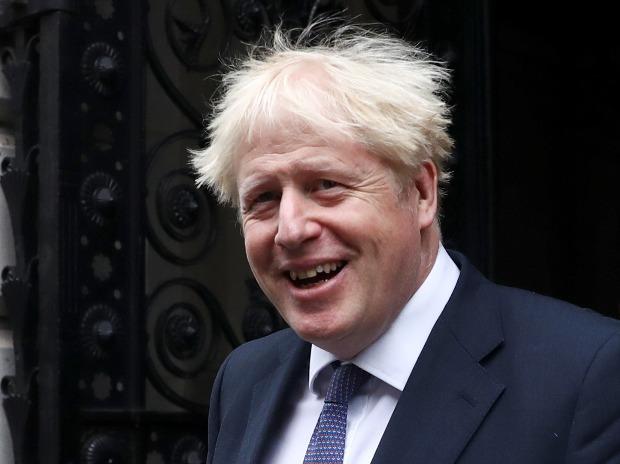British Prime Minister Boris Johnson announced on Wednesday that all the additional restrictions brought in to contain the spread of the Omicron, or Plan B measures, will be allowed to lapse from next Thursday as analysis shows that the new variant of COVID-19 has now most likely peaked in the country.
This means people in England will no longer be told to work from home where possible and mandatory COVID-19 vaccine certification required for large venues will also come to an end.
The government will also no longer mandate the wearing of face masks anywhere, relying on the judgment of the public instead, while compulsory face masks in school classrooms will be scrapped sooner from this week itself.
Johnson told the House of Commons that the latest Office for National Statistics (ONS) analysis shows that Omicron has now most likely peaked in the country, allowing for a move back to so-called Plan A or minimum COVID restrictions.
"Today's latest ONS data show clearly that infection levels are falling in England and while there are some places where cases are likely to continue rising, including in primary schools, our scientists believe it is likely that the Omicron wave has now peaked nationally, Johnson said.
"So, this morning, the Cabinet concluded that because of the extraordinary booster campaign, together with the way the public have responded to the Plan B measures, we can return to Plan A in England and allow Plan B regulations to expire. As a result, from the start of Thursday next week mandatory certification will end. Organisations can, of course, choose to use the NHS COVID pass voluntarily but we will end the compulsory use of COVID status certification in England, he said.
He pointed to ongoing significant pressures on the National Health Service (NHS), especially in the north east and north west, but noted that hospital admissions have now stabilised, with admissions in London even falling.
"The numbers in intensive care not only remain low but are actually also falling," added Johnson.
England had moved to the so-called Plan B measures on December 8, 2021, at the peak of the Omicron surge. Other devolved parts of the United Kingdom follow roughly similar guidelines on COVID restrictions.
(Only the headline and picture of this report may have been reworked by the Business Standard staff; the rest of the content is auto-generated from a syndicated feed.)
 Dear Reader,
Dear Reader,
Business Standard has always strived hard to provide up-to-date information and commentary on developments that are of interest to you and have wider political and economic implications for the country and the world. Your encouragement and constant feedback on how to improve our offering have only made our resolve and commitment to these ideals stronger. Even during these difficult times arising out of Covid-19, we continue to remain committed to keeping you informed and updated with credible news, authoritative views and incisive commentary on topical issues of relevance.
We, however, have a request.
As we battle the economic impact of the pandemic, we need your support even more, so that we can continue to offer you more quality content. Our subscription model has seen an encouraging response from many of you, who have subscribed to our online content. More subscription to our online content can only help us achieve the goals of offering you even better and more relevant content. We believe in free, fair and credible journalism. Your support through more subscriptions can help us practise the journalism to which we are committed.
Support quality journalism and subscribe to Business Standard.
Digital Editor

RECOMMENDED FOR YOU